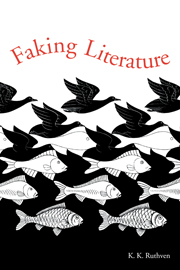Book contents
- Frontmatter
- Contents
- Acknowledgements
- List of abbreviations
- Prologue
- 1 Sampling the spurious
- 2 Framing literary forgery
- 3 Cultivating spuriosity
- 4 Faultlines of authorship
- 5 Fantasies of originality
- 6 Rhetorics of authenticity
- 7 Fake literature as critique
- Epilogue
- Bibliography
- Index of names
- Index of Subjects
4 - Faultlines of authorship
Published online by Cambridge University Press: 22 September 2009
- Frontmatter
- Contents
- Acknowledgements
- List of abbreviations
- Prologue
- 1 Sampling the spurious
- 2 Framing literary forgery
- 3 Cultivating spuriosity
- 4 Faultlines of authorship
- 5 Fantasies of originality
- 6 Rhetorics of authenticity
- 7 Fake literature as critique
- Epilogue
- Bibliography
- Index of names
- Index of Subjects
Summary
‘Authorship’ is such a vexed topic in literary studies that it cannot be used as the unproblematic base from which to critique the authorial duplicities of literary forgers. A key site for those who investigate the imbrication of literary forgery with literature is the Romantic ideology of authorship, whose operative terms are solitary geniuses and unique texts, the authoring of which authorises them. Here the critical task is relatively easy, for instead of having to go against the grain of common sense, literary theorists need only reflect on data accumulated by literary historians about irregular writing practices. By preserving the distinction between ‘mine’ and ‘thine’, the Romantic ideology of authorship prevents identity from deliquescing into the communal. It has more kudos in the humanities than in the sciences, which long ago abandoned the association of authorship with individuality. Yet it appears to be less of a nineteenth-century actuality than a twentieth-century construct designed for polemical and anti-Romantic purposes. For whereas Romantic theory undoubtedly privileged the uniqueness of solitary genius, Romantic practice condoned various kinds of collaboration. And it did so in a manner comparable to the discrepancy between a compositional myth of lyrical spontaneity (Wordsworth's ‘spontaneous overflow of powerful feelings’) and the contradictory manuscript evidence of extensive revision by Romantic poets, including collaborative revision. Wordsworth and Coleridge jointly wrote ‘The Three Graves’ and ‘The Wanderings of Cain’, but their best-known double-act is that landmark publication, Lyrical Ballads (1798), and their productive exchanges preceding the various prefaces it accumulated.
- Type
- Chapter
- Information
- Faking Literature , pp. 91 - 120Publisher: Cambridge University PressPrint publication year: 2001



